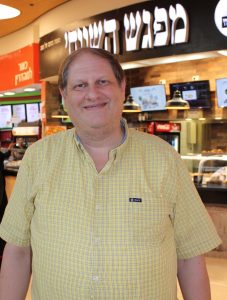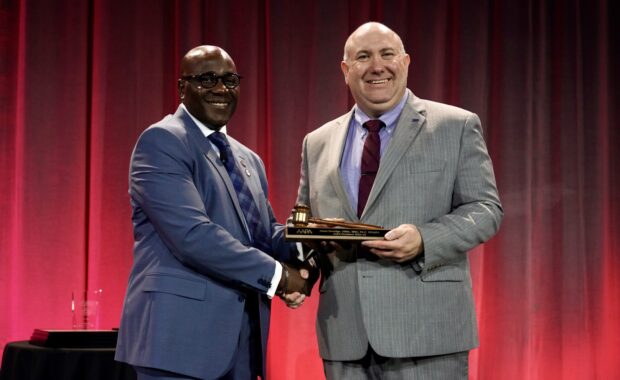PA Richie Kalker Commutes 6,000 Miles
Israel to Brooklyn Commute Works for PA Kalker
November 14, 2018
By Hillel Kuttler

Sitting in a Jerusalem shopping mall’s food court on an early-autumn weekday afternoon, Richie Kalker chatted relaxedly with a visitor, an impossible luxury when he’s in the United States.
That’s because Kalker, 58, spends weeks at a time, nearly every month, working long shifts as a PA in Wyckoff Heights Medical Center’s emergency room, 6,000 miles west of Israel’s capital, in Brooklyn, New York. The hospital is a short drive from Kalker’s American home in Queens – about the same distance the mall is from his Israeli home in the Jerusalem-area town of Efrat.
Kalker’s unusual lifestyle – living in one country, working in another – arose from his and his wife’s decision in 2007 to emigrate from their native New York to Israel. He had been working at Wyckoff since 1994 and was loath to leave the position. Kalker’s experience and value in the ER, along with the job’s shift nature, led his supervisors to approve the unconventional arrangement.
Saturday night flight and Sunday morning shift
Kalker normally flies from Tel Aviv on Saturday nights, takes a taxi from the New York airport to the hospital Sunday morning and is back in Israel two Thursdays later; at Wyckoff, he works five 12-hour shifts weekly, compared to the three shifts the dozen PAs there typically work. Kalker also spends entire summers in New York, when he likewise packs in the shifts. His summertime presence enables other PAs to take vacation, knowing that he’s covering their shifts.
Kalker’s boss, Bhakti Shah, called the arrangement eminently doable.
“It’s not the norm, but it works out well. We make it work,” said Shah, the chief PA in Wyckoff’s emergency room. “Usually, when he’s here, I can have two PAs off at the same time, because he covers. I consider this like a traveling PA, [but] instead of being away months at a time, he’s away weeks at a time.”
Like most Jewish people who’ve moved to Israel over the centuries, Kalker internalized the primary principle of Zionism: the religious and national attraction of living in the ancient Jewish homeland.
“We felt that this is where we belong and where we wanted to raise our children,” he explained of the move.
Gratification in emergency medicine
Kalker said that emergency medicine, where he works mostly in pediatrics, provides immense gratification. He likes the pace and the procedures, the suturing and the bone reductions. He treats children with asthma, diabetes, seizures, coughs and colds.
Kalker mentioned his favorite case. A young man had suffered a deep slice to his left ear when his bicycle struck a pole. Eight months later, the patient returned to the ER with a knee injury. He remembered Kalker and thanked him for suturing the ear. Kalker’s photographs showed the ear post-collision and at the second visit. The latter one revealed no evidence of the gruesome wound.
“I should’ve been a plastic surgeon,” a smiling Kalker said.
His interest in emergency medicine goes back to Kalker’s decade-long tenure as a volunteer EMT in a New York ambulance service, while working in an unrelated field: computer programming. Seeking a career change, Kalker considered attending medical school, but, with one child and another on the way, ruled it out as impractical. Kalker was intrigued with the PA profession, where some of his friends, including an ambulance colleague, worked.
That colleague, Doni Mayerfeld, moved to Israel in 1994, just as Kalker prepared to graduate Touro College’s PA Program. With the PA profession absent then in Israel (it began just recently), Mayerfeld shifted to medical-device sales.
“Everybody has to do what’s good for them financially and socially,” Mayerfeld said of Kalker’s commuting overseas.
Lifestyle agrees with PA
The lifestyle seems to agree with Kalker. On each stay in New York, he visits his mother and two siblings. With plenty of clothing at each home, there’s no need to check baggage on airplanes. As the father of five children, four of whom are grown, Kalker has saved a great deal in tuition for parochial-schools and universities, with Israel’s fees a fraction of America’s.
While making a good living in the job he’s now held for 24 years, though, Kalker incurs expenses most others don’t: maintaining a home and a car in each country, and paying approximately $14,000 annually in plane tickets.
Back in Israel after an intense period of work, Kalker can recharge his batteries, he said.
“It’s different, because when I’m [in Israel], I’m off,” he said. “I don’t think about work for a week and a half. There, I’m never off. It’s like a switch you turn on and off.”
Adjusting back to Israel is challenging, he explained.
“I’m used to doing things, moving. I can take [having time off] in short stretches. But for three weeks, I’d be out of my mind.”
With that, Kalker left the mall to drive home. Four days later, he’d head to New York. The day before that flight, his wife Terri would return to Israel.
A lawyer who maintained her New York practice, Terri returns to Queens for up to two weeks a month – same as Richie, but, with their 15-year-old daughter at home in Israel, rarely at the same time.
The couple is together all summer and during the High Holy Day season of early autumn. Other than that, they see one another just a few days each month.
Photo credit: Hillel Kuttler
Read More
International Rotations Expand Opportunities for PA Students
PA Julie Mueller Thrives in Remote Antarctica
Hillel Kuttler is a freelance writer. Contact him at [email protected].
Thank you for reading AAPA’s News Central
You have 2 articles left this month. Create a free account to read more stories, or become a member for more access to exclusive benefits! Already have an account? Log in.



